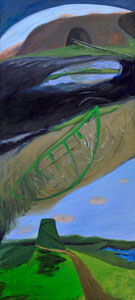Contrasts
As we travel from nothingness to nothingness, touching down on earth on the way, we live.
Those who live on earth with open ears and eyes and mind will perceive much to impress and move them. The environment can be beautiful and daunting, often simultaneously so and is mostly inexplicable. Those who observe and experience their surroundings, listening and attempting to understand will, without any prompting, play the drums, sing, dance or write poetry to exorcise and make it possible to draw near to the incomprehensible.
 I started to draw and paint. And however far my work distanced itself from the distinguishable, it never lost contact with the truth of what we actually perceive. Yet what we see is only one of the many facets of the infinite truth which we will most likely never be able to fully understand. This observance of the environment, presuming, associating, contrasting, is what fills the greatest part of our waking hours. Our dreams are sometimes forcefully complementary.
I started to draw and paint. And however far my work distanced itself from the distinguishable, it never lost contact with the truth of what we actually perceive. Yet what we see is only one of the many facets of the infinite truth which we will most likely never be able to fully understand. This observance of the environment, presuming, associating, contrasting, is what fills the greatest part of our waking hours. Our dreams are sometimes forcefully complementary.
During the long, slow train journey from Broken Hill to Sydney (Australia, 1999) I contemplated, travelling backwards whilst the train rolled forwards, that everything that we see and experience lies immediately behind us. That our lives are journeys which proceed backwards. Much of the work which I had made earlier falls into the category "Travelling backwards" and most of that which I have produced since 1999 has been titled as such.
In my drawings I have attempted to catch my subject, usually based on a land- or seascape, in one brushstroke. A direct approach that keeps one sharp and vigorous. The paintings involve more association, projection, by-thoughts and comparison so as to avert the loss of the inevitably distancing subject altogether. Moreover, this subject is invariably complemented by longing, joy and sorrow, by memory and knowledge.


Just as a city, from a bird's perspective, consists of cliffs and mice know no barriers, for an everyday painter there is no difference between the countryside and an urban environment. The city, the village, the fields are variations on a broad theme in which it is difficult for the sea to find a place. Is the sea formed by the rivers or are the rivers a secret penetration of the sea?
Considering that when travelling backwards the factor time, hardly noticeable, barely visible, is apparently the most significant, then this means that the ephemeral, in the end, is all-important. Once more, the contrast is almost incomprehensible
Hans Landsaat
February 2002, Amsterdam
